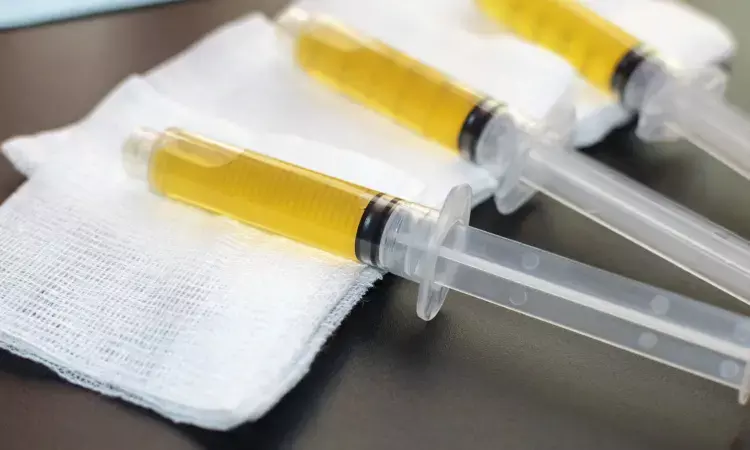- Home
- Medical news & Guidelines
- Anesthesiology
- Cardiology and CTVS
- Critical Care
- Dentistry
- Dermatology
- Diabetes and Endocrinology
- ENT
- Gastroenterology
- Medicine
- Nephrology
- Neurology
- Obstretics-Gynaecology
- Oncology
- Ophthalmology
- Orthopaedics
- Pediatrics-Neonatology
- Psychiatry
- Pulmonology
- Radiology
- Surgery
- Urology
- Laboratory Medicine
- Diet
- Nursing
- Paramedical
- Physiotherapy
- Health news
- Fact Check
- Bone Health Fact Check
- Brain Health Fact Check
- Cancer Related Fact Check
- Child Care Fact Check
- Dental and oral health fact check
- Diabetes and metabolic health fact check
- Diet and Nutrition Fact Check
- Eye and ENT Care Fact Check
- Fitness fact check
- Gut health fact check
- Heart health fact check
- Kidney health fact check
- Medical education fact check
- Men's health fact check
- Respiratory fact check
- Skin and hair care fact check
- Vaccine and Immunization fact check
- Women's health fact check
- AYUSH
- State News
- Andaman and Nicobar Islands
- Andhra Pradesh
- Arunachal Pradesh
- Assam
- Bihar
- Chandigarh
- Chattisgarh
- Dadra and Nagar Haveli
- Daman and Diu
- Delhi
- Goa
- Gujarat
- Haryana
- Himachal Pradesh
- Jammu & Kashmir
- Jharkhand
- Karnataka
- Kerala
- Ladakh
- Lakshadweep
- Madhya Pradesh
- Maharashtra
- Manipur
- Meghalaya
- Mizoram
- Nagaland
- Odisha
- Puducherry
- Punjab
- Rajasthan
- Sikkim
- Tamil Nadu
- Telangana
- Tripura
- Uttar Pradesh
- Uttrakhand
- West Bengal
- Medical Education
- Industry
Inadequate anticoagulation and hyperuricemia may cause knee pain after platelet-rich plasma injection: Study

A recent study provided strong evidence that platelet-rich plasma (PRP) therapy can delay the need for total knee replacement (TKR) in patients suffering from knee osteoarthritis (OA). However, the findings highlighted the importance of the preparation process, particularly the type and amount of anticoagulant used, which appears to significantly influence treatment outcomes.
The study retrospectively analyzed data from a total of 225 patients with knee OA who received PRP treatment between June 2021 and January 2022. The primary goal was to examine the relationship between the use of different anticoagulants in PRP preparation and the level of post-treatment pain experienced by patients. Also, the study evaluated the long-term efficacy of PRP treatment and identify other factors that might affect the success of therapy.
The patients were divided into groups based on the type and amount of anticoagulant used during the preparation of PRP. The groups included the individuals treated with varying doses of 4% sodium citrate (SC) (0.6 mL, 1 mL, and 2 mL) and heparin (0.1 mL and 0.2 mL). The research assessed pain levels after treatment, as well as the presence of inflammatory markers in the joint fluid like interleukin 6 (IL-6), tumor necrosis factor-α (TNF-α), and hypersensitive C-reactive protein (hs-CRP).
These findings revealed that patients in the 4% SC 0.6 mL and heparin 0.1 mL groups reported less pain following PRP treatment when compared to the patients in the high-dose anticoagulant groups. The lower levels of inflammatory markers were found in the joint fluid of patients who underwent less pain. This suggested that higher doses of anticoagulants may exacerbate inflammation which could lead to increased discomfort post-treatment.
Moreover, the study highlighted that patients treated with sodium citrate (SC) generally showed better medium- and long-term outcomes when compared to the patients treated with heparin. It was also noted that the therapeutic effect of PRP gradually diminished over time, indicating that while PRP can delay the progression of knee OA.
Another significant finding was the impact of poorly controlled hyperuricemia on treatment outcomes. The patients with elevated uric acid levels experienced more pain following PRP therapy which suggested that underlying metabolic conditions could negatively influence the effectiveness of the treatment. Further research is required to fully understand the safety and efficacy of PRP therapy and to optimize its use in clinical practice.
Source:
Chen, Y., Sang, H., Wu, S., Zhang, H., Zhang, Y., & Li, H. (2024). Inadequate anticoagulation and hyperuricemia cause knee pain after platelet-rich plasma injection: A retrospective study. In Journal of Orthopaedic Surgery (Vol. 32, Issue 2). SAGE Publications. https://doi.org/10.1177/10225536241277604
Neuroscience Masters graduate
Jacinthlyn Sylvia, a Neuroscience Master's graduate from Chennai has worked extensively in deciphering the neurobiology of cognition and motor control in aging. She also has spread-out exposure to Neurosurgery from her Bachelor’s. She is currently involved in active Neuro-Oncology research. She is an upcoming neuroscientist with a fiery passion for writing. Her news cover at Medical Dialogues feature recent discoveries and updates from the healthcare and biomedical research fields. She can be reached at editorial@medicaldialogues.in
Dr Kamal Kant Kohli-MBBS, DTCD- a chest specialist with more than 30 years of practice and a flair for writing clinical articles, Dr Kamal Kant Kohli joined Medical Dialogues as a Chief Editor of Medical News. Besides writing articles, as an editor, he proofreads and verifies all the medical content published on Medical Dialogues including those coming from journals, studies,medical conferences,guidelines etc. Email: drkohli@medicaldialogues.in. Contact no. 011-43720751


